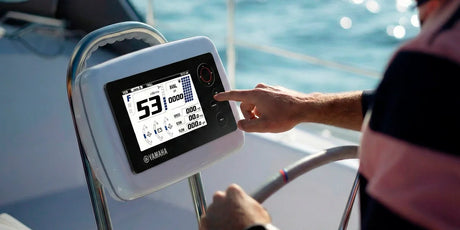This article was originally published on Boats for Sale.
Buying a boat is very exciting, and buying a used boat puts your dream boat within reach.
And while buying a pre-owned boat from a private seller can save money, it requires some self-confidence and shopping savvy. Boats change hands owners all the time without issue, but there are some potential pitfalls that buyers should understand before taking the plunge. Here are six tips to help ensure your pre-owned boat purchase from a private seller is a good decision.
Do Your Research
Researching makes and models of boats will give you an idea of what to expect in terms of features and performance.
Knowing what’s out there and the pros and cons of each will help you understand the value of the right boat. Additionally, researching prices for similar boats can give you more confidence in future negotiations with sellers. Knowing what other people have paid for similar watercrafts in recent years gives you a fair market price point for negotiating.

Find the Perfect Used Boat
As you dive into your boat search, utilize marketplaces like Boats for Sale that offer many options in one convenient place.
Their easy-to-navigate sales listings and proprietary tools help you identify the right type of boat for you. Then narrow down the selection to the best matches possible with sophisticated filters and listings full of crucial details. When you find a boat that really interests you, try to set up a phone call rather than an email dialogue, which can be easily used by a scammer.
Ask some basic questions to pre-qualify your seller, such as:
- The location of the boat;
- If it’s ready to put in the water;
- Are service records available and the title in hand;
- And perhaps the most basic—why are you selling this boat?
Don’t even consider buying a used boat unseen. Set up an in-person viewing if you feel good about the seller and still like the watercraft.
Arrange an Inspection
An engine and structural inspection will give you peace of mind when making your purchase decision.
Try to find an outboard specialist knowledgeable about engines that can provide insight into how well-maintained the boat and its motor is before buying. It’s also smart to have an experienced surveyor inspect the interior and exterior components, such as transom plates, propellers, electrical wiring, upholstery, bilges, superstructure, etc. This will help you feel confident that they are in good condition before committing. Even if it costs extra upfront, this could save thousands down the road in potential repairs or replacement costs due to unseen damages or wear and tear that were not disclosed by the private seller.

Take It for a Test Ride
Be sure to take the vessel for a sea trial before deciding whether this will be your next boat!
Feel for vibrations and listen for any unusual noises coming from different parts of the engine while running it. These could indicate problems with specific components that need repairing or replacing, which could be costly down the line. Pay attention to how well each system works during your test drive – does everything seem responsive? Does it take too long for something like trim tabs or flaps to move? Try out all accessories on board, like stereos and navigation systems. That way, you’ll know they are functioning correctly before signing off on the purchase agreement.
Run a Check
Ensure the HIN (Hull Identification Number) is on all boat documents and paperwork.
You’ll find the HIN on the upper part of the starboard (left) side of the transom. Ask to see a bill of sale from when the current owner purchased the boat to prove they are the valid owner.
Draft a Bill of Sale
Draw up a boat purchase agreement or bill of sale.
The agreement should specifically list all items or accessories you expect to be included in the sale. It may include electronics (including serial numbers), spare propellers, and even coolers or dock lines.
Buying pre-owned boats from a private seller can often save a lot of money compared to buying new ones from dealerships. However, take caution: buyers assume more responsibility than they would when purchasing through dealerships.
DO plenty of research ahead of time and having inspections done before signing any agreements. You’ll feel confident when taking on this “buyer beware” situation knowing they have taken all necessary precautions before investing their hard-earned money into such valuable assets.
Good luck and happy boating!












